

Living in the library world: Basic library procedures: Processing library materials. “The librarian’s mission should be, not like up to now, a mere handling of the book as an object, but rather a know how (mis au point) of the book as a vital function.”
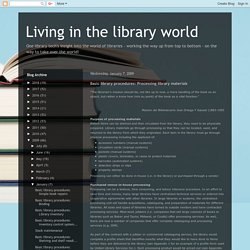
Mission del Bibliotecario Jose Ortega Y Gasset (1883-1955 Purpose of processing materials Before items can be shelved and then circulated from the library, they need to be physically prepared. Library materials go through processing so that they can be located, used, and returned to the library from which they originated. Each item in the library must go through physical processing including the applicant of: accession numbers (manual systems) circulation cards (manual systems) pockets (manual systems) plastic covers, laminates, or cases to protect materials barcodes (automated systems) detection strips or slips property stamps Processing can either be done in-house (i.e. in the library) or purchased through a vendor. Purchased versus in-house processing Steps involved with processing materials.
Learning to Sign. Tangle Drawing. Hand Crafts. Biographical Information/brief info. Library tech sites. About Digital Repositories. About: Archives. About: Digital Collections. Where to find books that are out of print. Library Management Systems. Cataloguing. Collection Management. Book Concervation and Preservation. Anythink. Copyright Information and Issues. Education related information. History. Natural health Information. Library Technology Studies. Annotating Resources. Family History Research Sites. Scholarly Communication and Journals.
Online Dictionaries and Thesaauruses. Research Models. Content Curation. Searching Tutorials and tools. Library and Customer Service. Web Page Creation and Social Media. Writing. Online libraries. Team Effectiveness stuff..... Citing and Referencing Help/Resources. Information around Reference Services. Library Science. OA Sites. Libraries Engaging the Community. Referenceandinformationresources / Plagiarism Resources. Tutorials: Two brief videos from ABC News (one focuses on the videos available on YouTube that "teach" cheating): From Connect with Kids:
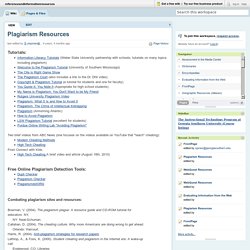
Children prefer to read books on paper rather than screens. There is a common perception that children are more likely to read if it is on a device such as an iPad or Kindles.

UsefulCharts: History timelines, classroom posters & science charts. Print your own masterpieces and digital pens. People can now access much of Sydney’s Museum of Applied Arts and Sciences’ extensive collection online.
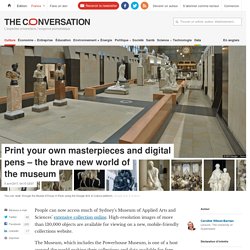
AASL Infographic FINAL. AustLit: Discover Australian Stories. Standards. 10 Reasons Librarians Are More Important Than Ever. It's National Library Week, and we couldn't resist paying homage to one of the most important members of the school community: librarians.
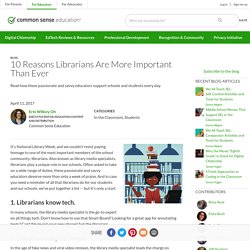
Also known as library media specialists, librarians play a unique role in our schools. Meet the digital librarians saving social media posts to protect human rights - RN. Posted When 18-year-old African-American Michael Brown was shot six times by police in Ferguson, Missouri, Ed Summers and his colleagues quickly began collecting tweets.
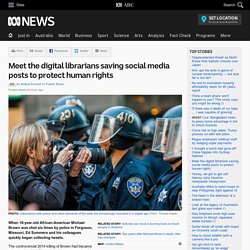
The controversial 2014 killing of Brown had became a focal point of the Black Lives Matter campaign: Mr Summers' team were looking to use the social media platform as a new tool for documenting abuse. 23mobilethings - exploring the potential of mobile tools for delivering library services : 23mobilethings. 14 Ways to Acquire Knowledge: A Timeless Guide from 1936.
Consider the knowledge you already have — the things you really know you can do.
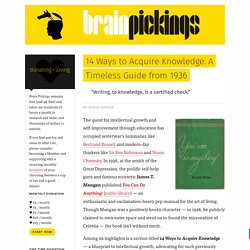
They are the things you have done over and over; practiced them so often that they became second nature. Every normal person knows how to walk and talk. But he could never have acquired this knowledge without practice. Ten Skills for the Future Workforce. Ten Skills for the Future Workforce Sense-making, social intelligence, novel & adaptive thinking, cross-cultural competency, computational thinking, new-media literacy, transdisciplarity, design mindset, cognitive load management, virtual collaboration.
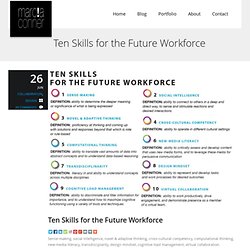
These are the 10 skills needed for the future workforce. For a full report, see the work done by the Institute for the Future with Apollo Group looking at the Skills Needed by 2020 (also available on the IFTF website). 10 Ways to Spot a Fake News Article - EasyBib Blog. Manual tasks and ergonomics. Manual tasks includes a range of activities in the school and work environment including moving furniture, entering data into a computer, carrying a bag full of sporting equipment, using a hedge trimmer and transferring a student from a wheelchair onto a toilet.
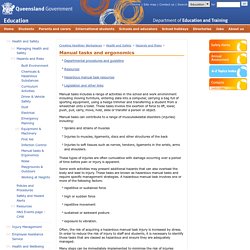
These tasks involve the exertion of force to lift, lower, push, pull, carry, move, hold, slide or transfer a person or object. Manual tasks can contribute to a range of musculoskeletal disorders (injuries) including: Sprains and strains of musclesInjuries to muscles, ligaments, discs and other structures of the backInjuries to soft tissues such as nerves, tendons, ligaments in the wrists, arms and shoulders. These types of injuries are often cumulative with damage occurring over a period of time before pain or injury is apparent.
Some work activities may present additional hazards that can also overload the body and lead to injury. Often, the risk of acquiring a hazardous manual task injury is increased by stress. Resources. Oxford University Press (OUP) - Academic Publishing - Homepage. An Introduction to the Semantic Web. The Story of Stuff. The Story of Stuff, originally released in December 2007, is a 20-minute, fast-paced, fact-filled look at the underside of our production and consumption patterns.
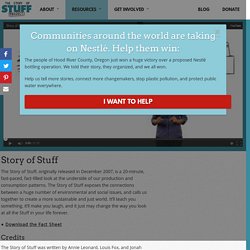
The Story of Stuff exposes the connections between a huge number of environmental and social issues, and calls us together to create a more sustainable and just world. It’ll teach you something, it’ll make you laugh, and it just may change the way you look at all the Stuff in your life forever. Download the Fact Sheet.
Library staples: what people really want from their libraries! Let’s call it the Apple Store Agenda, an environment where you can relax, use the gizmos and gadgets, get online or take a class without anyone hassling you or being too invasive. Thanks to pioneers such as Apple, Google and the like, the world’s now filled to the brim with modern day consumers who have expectations - expectations that the basic staples will always be available to them, and they will be of a certain quality. What does that mean to anyone wanting to attract a new audience into their world or space?
It’s simple, provide the basic quality staples and your target audience shall come (assuming you have the right stapes for the right target audience, and of course - they know about it!). With libraries as a leading community resource, we generally have this element of our organisation pretty well handled. However we thought it might be interesting to review the top five library staples - according to our research. High speed free internet. Seems fairly simple enough right?
CUE17 News and Media Literacy - Google Slides. Policy and planning. IMDb - Movies, TV and Celebrities DATABASE. Take action – Fair Copyright. 1. Email your politicians Please use the form below to quickly find and send and email to your local MP and the Senators that represent your state or territory to tell them that you support fair use for Australia.
Many federal politicians do not yet really understand why Australia urgently needs fair use. Library Hand, the Fastidiously Neat Penmanship Style Made for Card Catalogs - Atlas Obscura. In September 1885, a bunch of librarians spent four days holed up in scenic Lake George, just over 200 miles north of New York City. In the presence of such library-world luminaries as Melvil Dewey—the well-organized chap whose Dewey Decimal System keeps shelves orderly to this day—they discussed a range of issues, from the significance of the term “bookworm” to the question of whether libraries ought to have a separate reference-room for ladies.
They then turned their attention to another crucial issue: handwriting. As libraries acquired more books, card catalogs needed to expand fast in order to keep track of them. Though the newly invented typewriter was beginning to take hold, it took time and effort to teach the art of “machine writing.” Lumosity. Publications. Download, view, and print publications All MoneySmart publications are listed below as downloadable PDFs. Some are available to order as hard copies (see our order publications page). Note: If any PDF file size is larger than 2MB, it will be stated below. Managing your money Borrowing and credit. "Cheat sheets for Technology" students.